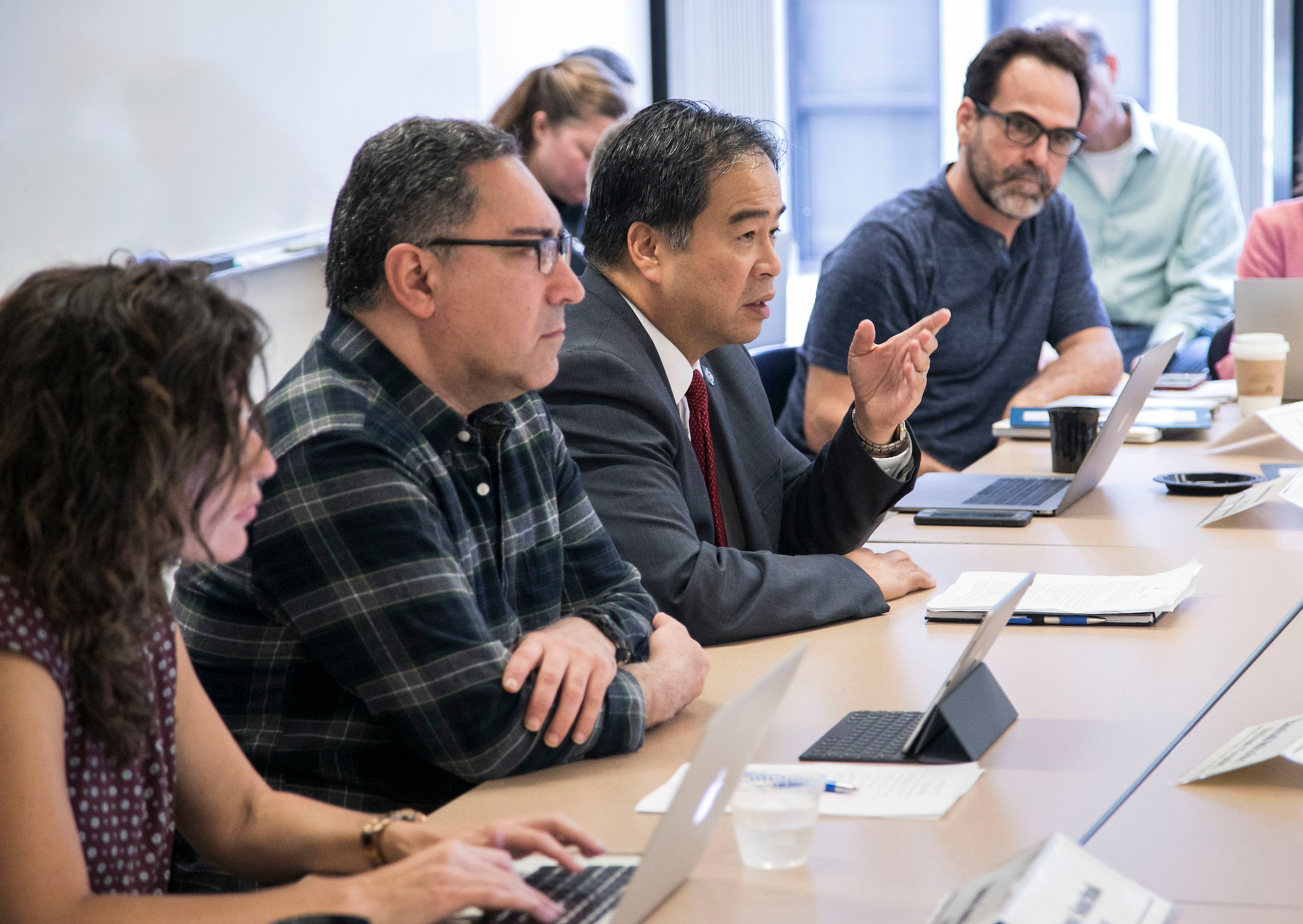 President A. Gabriel Esteban, Ph.D., recommends organizations develop plans to have an idea of what the future could look like, yet remain flexible and adjust to changes in the environment. He shared his thoughts with members of the Faculty Council during their first meeting of the 2017-18 academic year, where they discussed the process for the next strategic plan. (DePaul University/Jamie Moncrief)
President A. Gabriel Esteban, Ph.D., recommends organizations develop plans to have an idea of what the future could look like, yet remain flexible and adjust to changes in the environment. He shared his thoughts with members of the Faculty Council during their first meeting of the 2017-18 academic year, where they discussed the process for the next strategic plan. (DePaul University/Jamie Moncrief)
His mother was a schoolteacher; his late father, a professor of medicine. One might presume President A. Gabriel Esteban, Ph.D., was destined for higher education.
"I was familiar with the university lifestyle, but I never thought I would be in that world," Esteban says.
He expected to teach while pursuing his doctorate and return to the private sector. But after a year in higher education, he became a part-time administrator. "I found it fascinating."
After years in the top echelon of higher education, Esteban has ample experience driving strategic plans to fruition. The following is an edited transcript sharing his thoughts about strategic planning as DePaul plots its future.
Can you tell us about your background in strategic planning?
During my first teaching job in the University of Houston system, I was asked to set up an office of institutional research and planning. That's where I got familiar with the metrics we use in higher ed. We developed diversity plans, enrollment management plans and goals that fed into the system's plans. I was involved in setting up a branch campus as well.
As provost of the University of Central Arkansas, I was asked to lead strategic planning. Out of that came a campus master plan. At Seton Hall, I completed a strategic plan and campus master plan. Our planning at Seton Hall started under difficult economic circumstances in 2008-09, yet the university made great strides in important areas.
I also did corporate planning at the largest consumer goods company in the Philippines. I was an investment analyst and evaluated projects. That's where I first started to realize the importance of looking at things from a system-wide perspective instead of individual pieces of a bigger puzzle.
What makes a good strategic plan and how does it move a university forward?
Good planning needs community-wide buy-in from the beginning. The other hallmark is that members of the planning teams and task forces must not think of themselves and their departments, but think in terms of the university at large. You have to think beyond your discipline or functional area; you have to think of the institution as a whole, but keep your perspective.
Strategic planning also has to be mission focused; otherwise, it will flounder.
You need goals that can be measured, such as an enrollment target, graduation rates and diversity objectives. If you don't meet those metrics, understanding why you didn't meet them is just as important as finding out why you met them.
I believe in setting ambitious goals. If you don't stretch, how can you make real progress? If you establish easy goals you know you can meet, why set them to begin with?
What do you see as DePaul's unique character and special strengths?
Your mission differentiates you. How do you brand that mission? How do you use it as a competitive advantage? In the business world, you talk about your unique selling proposition. Why do you pay $100 for a meal versus $10? Is there 10 times more delight in eating it?
DePaul is very innovative in terms of academic programs. People are willing to work across disciplines and come up with creative programs that position our students to succeed. Despite the fact that enrollment has dropped fairly significantly in the last five years, if not for these new programs, it would have dropped a whole lot more. That's a great strength for DePaul, having that willingness to innovate, to work across areas. It is something we should nurture and find ways to support.
What will your role be in shaping the final plan?
I plan to charge the task force, talk about where I think the future is headed, the challenges, and then step back. If needed, they can call on me. I don't intend to get directly engaged. As people see all the data I have seen in the short time I've been here, then people will come to very similar conclusions as to what our future could and should look like. Although there is very broad direction from the board and myself, I'd rather see a plan bubble up from the university community.